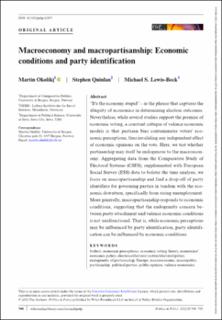Macroeconomy and macropartisanship: Economic conditions and party identification
Journal article, Peer reviewed
Published version

Åpne
Permanent lenke
https://hdl.handle.net/11250/3063720Utgivelsesdato
2022Metadata
Vis full innførselSamlinger
Sammendrag
“It's the economy stupid”—is the phrase that captures the ubiquity of economics in determining election outcomes. Nevertheless, while several studies support the premise of economic voting, a constant critique of valence economic models is that partisan bias contaminates voters' economic perceptions, thus invaliding any independent effect of economic opinions on the vote. Here, we test whether partisanship may itself be endogenous to the macroeconomy. Aggregating data from the Comparative Study of Electoral Systems (CSES), supplemented with European Social Survey (ESS) data to bolster the time analysis, we focus on macropartisanship and find a drop-off of party identifiers for governing parties in tandem with the economic downturn, specifically from rising unemployment. More generally, macropartisanship responds to economic conditions, suggesting that the endogeneity concern between party attachment and valence economic conditions is not unidirectional. That is, while economic perceptions may be influenced by party identification, party identification can be influenced by economic conditions.
